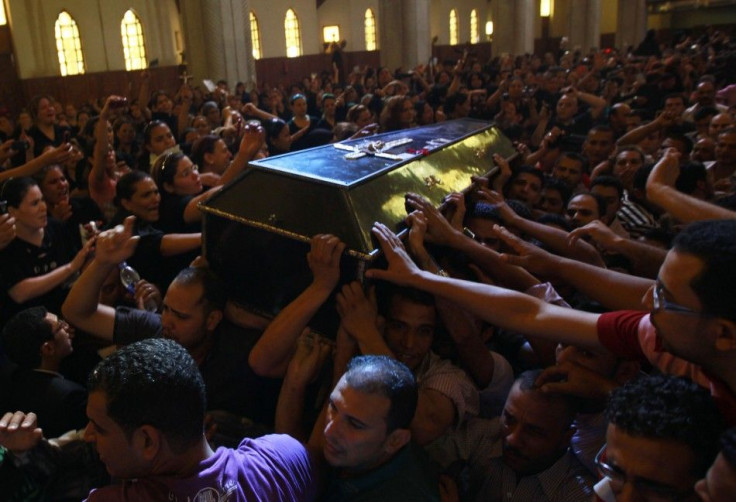Egyptian Army Vehicles Run-Down Christian Protestors [VIDEO]

Christian protestors in Cairo, Egypt were attacked on Sunday night, turning a moderate demonstration into all out anarchy.
A group of Copts, a Christian minority that makes up about 10 percent of Egypt's population, gathered in Cairo to show their outrage over a recent wave of church vandalism.
In the absence of law, you can understand how demolishing a church goes unpunished, Coptic scholar Wassem el-Siss told The Associated Press. I have not heard of anyone who got arrested or prosecuted.
On Sunday, Copts marching through Cairo were attacked by both plain-clothed thugs and military personnel, who used armored troop carriers as battering rams. The violence outraged many in the capital, some of whom found back, pounding military vehicles with rocks, sticks and firebombs.
About 25 people were killed and nearly 300 injured. The funerals for the 20 Coptic Christians killed during the protest were held on Monday.
Coptic blood in Egypt is cheap and the military council knows they can get away with killing us because we're a minority, Fakhri Girgis Fakhri, a mourner at the funeral presided over by Coptic Pope Shenouda III, told The Los Angeles Times. When a Muslim protester gets killed, the whole country gets on its feet, but when Copts are killed, nothing happens.
Seven months ago, Egypt was hailed as the shining example of the Arab Spring. It was the country where peaceful citizens toppled a vicious and repressive regime in just a few weeks -- the country where civil liberty and democracy beat out totalitarianism and tyranny.
However, Egypt has struggled to build new government after the expulsion of President Hosni Mubarak in February, and despite a promise to usher in a new political system, the Egyptian army's Supreme Council of the Armed Forces is still holding onto control.
“This is a huge crisis that could end in a civil clash. It could end in dire consequences,” presidential hopeful Amr Moussa said, according to Reuters. “An immediate investigation committee must be formed, with immediate results.”
Egyptian officials have blamed the riots on outside agitators and deferred any blame away from themselves. Sadly, this type of rhetoric is still being used by oppressive leaders like Syrian President Bashar al-Assad, who uses it to discredit the progressive movement in his country.
Instead of advancing to build a modern state of democratic principles, we are back searching for security and stability, said Egyptian Prime Minister Essam Sharaf Sharaf. We will not surrender to these malicious conspiracies and we will not accept reverting back.
© Copyright IBTimes 2024. All rights reserved.











